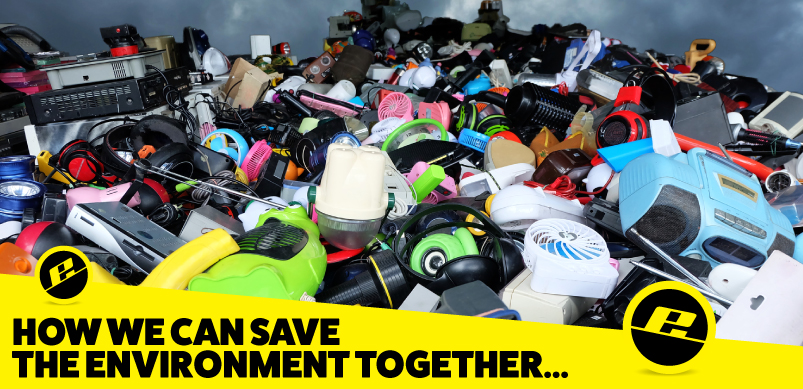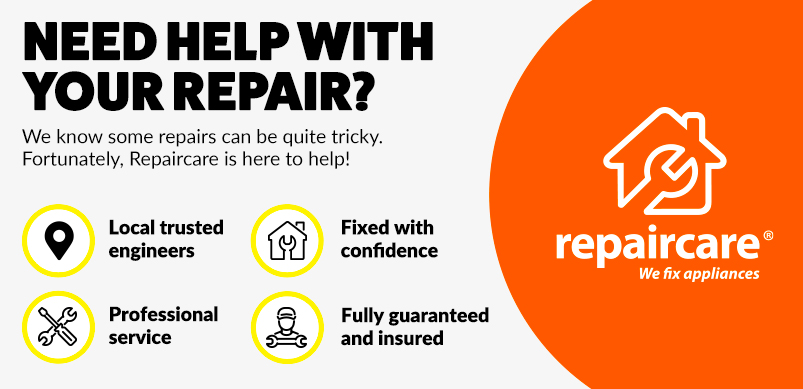
Why the e-waste crisis is no joke and what we can all do to help
March 15, 2023 | Repair, Re-use & Recycle | No comments
E-waste (or electrical waste) refers to any discarded electrical or electronic devices, from phones and laptops to fridges and lawnmowers. It is, in fact, the fastest growing waste stream in the world, with discarded or hoarded household electricals costing the UK economy hundreds of millions of pounds every year!
This isn’t just a financial problem either, as the growing problem of e-waste can be just as catastrophic to our environment. When this waste is disposed of improperly, the heavy metals, plastics and glass can pollute the air or seep into waterways. Unfortunately, this issue is projected to keep getting worse rather than better. In fact, it’s estimated that by 2030, annual global e-waste generation will have reached a staggering 74.7 million tons. So, how can we tackle this and make sure this waste is being disposed of in a way that doesn’t continue to affect our environment? Let’s take a look…
Repair, don’t replace!
Of course, the most obvious answer to preventing e-waste is simply “buy fewer electronic gadgets and appliances”. Unfortunately, in the ever-growing digital age, it isn’t always that simple… but there are plenty of ways you can keep your e-waste output to a minimum. One of the best ways of all is to repair instead of replace, and to be content with what you have as long as it can still fulfil your needs.
Whether it’s your phone, laptop, TV or any one of your household appliances such as your oven, washing machine or fridge freezer, minimising your e-waste starts by not constantly chasing the next new model. Instead, you should try to combat our current throwaway culture by keeping your current electronics working, rather than throwing them out as soon as they develop a fault in favour of a newer, more costly replacement.

eSpares is here to help
There are plenty of resources online to help if home repairs are a little daunting for you, and you’d be surprised at how easy it can be to maintain your electronics and appliances once you take the leap. Here at eSpares, we’re here with you every step of the way from diagnosing your appliance fault to finding the parts you need and fixing it yourself!



Additionally, there are some great organisations such as The Restart Project which help people learn how to repair their own broken electronics through community fixing workshops known as ‘Repair Parties’. Have a look if any of these fixing workshops are happening near you and you’ll be fixing up your own phone, laptop, kettle or toaster in no time!
Save £££
Not only does fixing your appliances yourself help tackle the problem of e-waste, but it also helps your pocket too! So many of our customers have saved hundreds by not purchasing a new appliance and forking out on hefty repair bills, all by just taking on the challenge themselves.

Pass it over to the pros
Unfortunately, on some occasions, even your best efforts aren’t quite enough to fix something yourself. You know how sometimes you’ve identified the problem, bought the spare part – even followed our how-to video tutorials! – but you STILL find yourself scratching your head in confusion? That’s because, every now and then, an appliance repair can just be too tricky to figure out for the every day appliance owner…

But that doesn’t mean it’s time to chuck your appliance away! When a particularly troublesome error arises that you can’t quite fix yourself, you can always seek professional help instead. Our good friends over at Repaircare have hundreds of qualified engineers who can be booked to come and make sure your appliance doesn’t end up on the scrap heap. Having already helped over a million households nationwide with fixed price appliance repairs, Repaircare are a truly trustworthy service to help repair your oven, washing machine, fridge freezer or any other household appliance that’s on the blink without any surprise costs.
To get a repair booked in with Repaircare, simply head to their website and get in touch. You can easily enter all your details online (including your address and the make and model of your faulty appliance) to get scheduled in with a repair and keep your appliance running for years to come!
Be wise with your waste
Finally, when repairing simply isn’t an option and it truly is time to throw your electronic goods away, make sure you’re disposing of them in the most environmentally friendly manner, rather than simply adding them to a landfill. After all, even when your appliances and gadgets are beyond repair, that still doesn’t mean they necessarily need to be added to the ever-growing global e-waste mountain!
What many people don’t realise is that a lot of what they consider ‘waste’ isn’t actually waste at all, but can be recycled and reused in some manner. That includes…

So make sure you’re recycling all of the above! By ensuring such items get reused instead of reduced to needless e-waste, you’ll be doing the planet just as much good as by repairing. There are plenty of resources out there to make recycling easy too. For example, you can find a recycling centre near you for convenience, or even reach out to your local council which will collect your unwanted large appliances for a small fee. On top of this, some stores such as Currys and Argos will usually give you the option for them to take away old appliances you bought from them and recycle them. Currys even offer a free recycling service – simply bring your old appliance to their stores and they’ll do the rest!
Last, but certainly not least, you can give your electronic goods to those in need! If you have an electrical item that’s working fine and still in decent condition but you’ve decided you just need a newer one, do a good deed and donate it to charity. Causes such as The British Heart Foundation and British Red Cross welcome donations of electrical items to sell in their home stores and help those in need. Reuse Network is also a great way to give away your unwanted electricals. They can direct you to places you can donate your items near you and ensure they are going to a good home.
We hope this blog post has encouraged you to join the fight against e-waste. Together, we can help make the future of our world a lot greener! For even more advice, check out our blog post on 20 ways you can save the planet right no
Tags: e-waste, Fix it Yourself, Recycle

